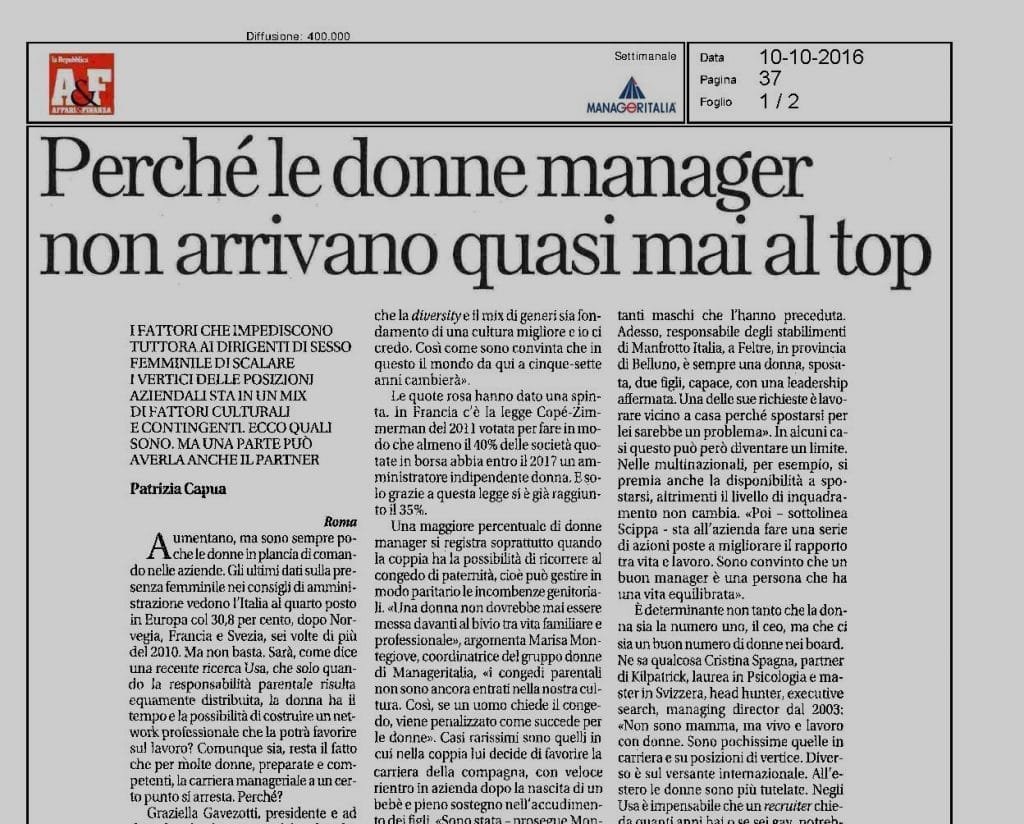Interview to Cristina Spagna – Managing Director Kilpatrick Italy
by Patrizia Capua – La Repubblica A&F
While the barriers preventing female executives from climbing the corporate ladder and from reaching top-ranking professional positions have been identified to reside in a mix of cultural factors and circumstances, the partner too may play a role.
Recent figures show that, although on the rise, the number of women heading companies and sitting on the Board of Directors is still pretty low. Here are some figures: with its 30,8%, Italy ranks fourth in Europe, behind Norway, France and Sweden, six times higher than in 2010. One may wonder if a recent USA research is right in claiming that only when parental responsibility is equally shared, can women commit time to building a professional network leading to higher professional achievement. Even if knowledgeable and skilled, there inevitably comes a moment when the career of a great many women seems to come to a standstill. Why?
Graziella Gavezzotti, President and Ceo of Endered Italy, Southern Europe and Africa, embodies the opposite example. Two degrees, married, with a child, the manager claims that in order to reach top-ranking positions in a company, a woman must be skilled and ready to shoulder growing responsibilities. Women are potentially as talented as men but they need strength of will. On the other hand, companies must be ready to invest and sustain the evolution and growth of every single resource. The working environment must pave the way to promoting the belief that diversity and mixed genders are crucial to the creation of a far-sighted culture.
The law Cope’-Zimmerman, enforced in France in 2011, provides that by 2017 at least 40% of the companies listed on the Stock Exchange will have to appoint a woman as CEO and, thanks to the above law, the percentage today accounts for 35%.
While a higher percentage of women managers is recorded when the couple can rely on the paternity leave, by Italian standards the parental leave is not an established cultural factor yet. If a man is ever to apply for a paternity leave, this decision impacts him as negatively as women. For this reason very few men are likely to step back and stay at home to look after the baby in order to favour their partner’s career.
Marco Scippa, Human Resource at Vitec, claims that while women have often been shown to outperform their male peers in terms of leadership and talent, at times the need to work near home turns out as an actual limit to their career. As a matter of fact, multinational corporations often reward a woman’s readiness to travel on business to the aim of improving her professional profile. On the other hand it is up to the company improving the relationship between life and work. A good manager is a person with a balanced life.
While women are not necessarily to be a company’s number one or CEO, a Board of Directors should number a reasonable number of women. In this regard, Cristina Spagna, Kilpatrick Partner, Head Hunter, Executive Search and Managing Director since 2003 tells her story: “I am not a mother but I work with and live surrounded by women. Very few of them are career-oriented and occupy top-ranked positions. Things are different abroad where women enjoy more favourable conditions and protection. In the USA a recruiter could be sued on the spot if he/she asked the candidate: “How old are you or are you gay?” Questions revolving around private matters are banned.
Indeed the question is a different one: “Are you up to doing this job?” On the other hand there are positions and jobs that are slightly more masculine, like being a CFO. In Italy a smaller number of women sits on the Board of Directors because not every woman is consecrated to sacrifice. I have colleagues who work as hard as I do even if they have a family and others who lost their family to their career. I do not think it is just a matter of sexism, a woman has to invest in her career, be at the right place, rub shoulders with plenty of connections and commit time to building a network. This implies she has to commit extra time outside the average eight working hours. Men have an easier life because, in principle, at the end of a working day, rushing home to cook dinner is not their top of mind concern”.

